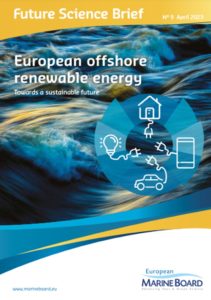A new European Marine Board (EMB) report outlines the main gaps in our knowledge that could prevent the offshore renewable energy sector from developing in a sustainable, equitable and responsible manner.
The new EMB Future Science Brief No. 9 ‘European offshore renewable energy: Towards a sustainable future’ has been launched on April 4th, 2023. The need to decrease carbon emissions urgently and dramatically is high on scientific, political, and societal agendas. Extraction of energy from offshore renewable energy sources is seen as a key measure to achieving this decrease in carbon emission.

To achieve the EU Green Deal vision, the installed offshore renewable energy generating capability in European must increase 30-fold compared to current installed capacity. However, in the rush to develop and install new offshore renewable energy devices across the European sea basins, their potential environmental and societal impacts cannot be ignored. The EMB Future Science Brief highlights which steps need to be taken to ensure that the expansion of this sector is managed sustainably, responsibly and equitably.
The document presents the technical, environmental, and socioeconomic state of the art of the offshore renewable sector, with a focus on European development. It presents the key knowledge, research, and capacity gaps that must be addressed to ensure sustainable delivery of the EU Green Deal and closes with key policy, research, capacity, and data recommendations to take the sector forward.
Download: European offshore renewable energy: Towards a sustainable future
If you would like to receive hard copies of this publication, please contact info@marineboard.eu and confirm the number of copies and your postal address.
The European Marine Board (EMB) is a leading European think tank in marine science policy. EMB is a network with a membership comprising over 10,000 marine scientists from the major national marine/oceanographic institutes, research funding agencies and national networks of universities from countries across Europe. The Board provides a platform for its member organizations to develop common priorities, to advance marine research, and to bridge the gap between science and policy to meet future marine science challenges and opportunities. The Belgian Federal State is represented in the EMB by the Belgian Science Policy Office (BELSPO) and in the EMB Communications Panel by the Royal Belgian Institute of Natural Sciences (RBINS).
The RBINS expertise on monitoring the environmental impact of offshore wind farms is frequently cited in the new EMB Future Science Brief ‘European offshore renewable energy: Towards a sustainable future’.

